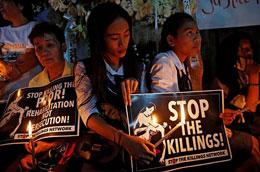Filipino cops on a killing spree

Philippines President Rodrigo Duterte’s chilling promise to “drug pushers, holdup men, and do-nothings, you better get out […] because I’ll kill you” may finally come back to haunt him.
The International Criminal Court Prosecutor Fatou Bensouda announced that she has asked the court’s judges to approve her investigation into crimes committed in the Philippines from November 1, 2011, the date the Philippines became an ICC member, until March 16, 2019. On March 17, 2019, the Philippines effectively withdrew from the court.
A possible ICC investigation into the thousands of “drug war” killings in the Philippines is especially welcome given the United Nations Human Rights Council has yet to effectively condemn the Duterte government’s atrocities, despite a scathing report by the UN top rights’ commissioner sounding the alarm on the scale and gravity of the situation, said Human Rights Watch.
In 2017, Human Rights Watch found President Duterte and other senior officials have instigated and incited killings of mostly the urban poor in a campaign that could amount to crimes against humanity. According to the Philippine Drug Enforcement Agency, 6,117 individuals were killed during police anti-drug operations from July 1, 2016, to April 30, 2021. The Philippine National Police has a higher figure – 7,884 killed up to August 1, 2020.
Instead of condemning these abuses, the UN Human Rights Council has opted instead to provide technical cooperation and capacity-building to the same government that denies the true scale and severity of the human rights violations, has publicly endorsed the policy of killings, avoids independent investigations, and continues to crack down on civil society.
In his February 2021 address to the Human Rights Council, head of the Philippine Department of Justice, Menardo Guevarra, admitted police culpability in thousands of “drug war” killings. But while the new police chief, General Guillermo Eleazar, has promised to cooperate with the Department of Justice, he is only allowing access to 53 case files.
There is an urgent need for a Human Rights Council-backed investigation. The government’s campaign of extrajudicial killings has continued well beyond its withdrawal from the ICC, with devastating consequences for victims and their families, including children. And the killings have only intensified during the Covid-19 pandemic.
Meanwhile, a Human Rights Watch report said the recent killing of a woman allegedly by a drunken, off-duty police officer has once again put the spotlight on abusive police conduct in the Philippines.
The fatal shooting in Quezon City of Lilybeth Valdez, a 52-year-old mother, was caught on video and was disturbingly reminiscent of a December 2020 police killing. The public outcry was swift.
The Philippine National Police (PNP) has vowed to hold accountable the suspect, Police Master Sergeant Hensie Zinampan. Police Chief Gen. Guillermo Eleazar promised justice, and publicly berated and manhandled the officer in a video released by the PNP.
Various groups have linked the killing to the country’s culture of impunity that has worsened in the past five years under President Rodrigo Duterte’s “war on drugs,” in which police and their associates have killed thousands of drug suspects in evident disregard for the law.
The December incident involved an off-duty police officer who was videoed shooting dead a mother and her son in Tarlac province. And there’s the police murder of Kian delos Santos, currently the only “drug war” killing that resulted in a court conviction, mainly because of CCTV footage showing police dragging the 17-year-old boy to a dark alley where he was later found dead.
These incidents underscore the need for police to wear body cameras with appropriate protocols during operations, said Human Rights Watch.
“The PNP agreed to using body cameras and acquired thousands. But wearing them has not been rolled out because the police claim they still need to develop clear protocols. To prevent video from being manipulated by the police, it will be necessary to prevent officers from being able to turn the cameras on and off at will, and there need to be rules on providing footage to victims and their families, as well as the public.
While cameras alone won’t stop police abuses, they bring a measure of transparency during police operations, particularly in drug raids where the PNP often claims, without evidence, that the victims fought back. The PNP needs to demonstrate they are serious about accountability and start requiring the police to use the cameras. Perhaps then the deaths of Valdez, delos Santos, and others will not be in vain.”






